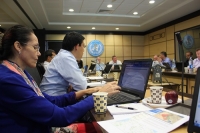 We must not forget that our ultimate purpose is to eradicate polio, and we do that by reaching every last child with vaccineA multi-country, multi-agency strategic planning meeting focused on reviewing strategies to limit the transmission of wild poliovirus in the Middle East was held recently in Amman, Jordan.
We must not forget that our ultimate purpose is to eradicate polio, and we do that by reaching every last child with vaccineA multi-country, multi-agency strategic planning meeting focused on reviewing strategies to limit the transmission of wild poliovirus in the Middle East was held recently in Amman, Jordan.
Led by WHO and as part of the Global Polio Eradication Initiative, the risk mapping and campaign monitoring workshop brought together health professionals from WHO and UNICEF regional and country offices and WHO headquarters, the US Centers for Disease Control and Prevention (CDC), Office of the United Nations High Commissioner for Refugees (UNHCR), United Nations Relief and Works Agency for Palestine Refugees in the Near East (UNRWA), United Nations Office for the Coordination of Humanitarian Affairs (UNOCHA) and Global Good.
The meeting in Amman centered on assessing the coordinated approach by UN agencies and partner organizations in responding to the poliovirus outbreak in the Middle East.
UN health professionals from Syria, Iraq, Lebanon, Jordan, Egypt and Turkey discussed the challenges at individual country level in implementing the programme and reviewed the strategies for moving into the next vaccination rounds across the region.
“There are a number of unique elements of the Middle East outbreak and response, particularly that we have multiple countries that are facing complex emergencies,” said WHO Polio Eradication and Emergency Support Manager Chris Maher.
“In the face of this, we are coordinating with our partner agencies to agree on common goals and outcomes, while challenging our operational processes to support our Member States in eradicating polio, for the best possible impact on health across the region” he said.
A total of 38 cases have been confirmed in Syria and Iraq since the outbreak began in October 2013. Prior to the outbreak the region has been Polio free for 15 years.
The recent spread of wild poliovirus during what is normally the low-transmission season has been described as an ‘extraordinary event’ and in August WHO declared the polio spread to be a public health emergency of international concern, requiring a coordinated international response to prevent the situation from worsening.
Using existing innovations in mapping and surveillance, which have been successfully implemented in polio-endemic countries like Nigeria, representatives have collaborated on best practice to ensure quality implementation ahead of two upcoming synchronized campaigns across the Middle East region.
To better address the regional and global polio risk assessment in the context of a humanitarian crisis the group also explored the use of mobile technology in the field and standardization of tools and indicators for measuring success.
“New ways of using information technology are proving extremely useful in disease detection and surveillance and is increasing the speed and ease of disease reporting for health services, which is one of our chief priorities,” he said.
The workshop, held two weeks ahead of the Phase 2 review of the Strategic plan for polio response in the Middle East, will set the agenda for discussions when the lead agencies and health experts convene in Beirut in September.
“Each country is taking lessons learnt in the field and adapting them to their own conditions based on
issues specific to their country; this is driving improvements in delivering the life-saving vaccine.”
“We must not forget that our ultimate purpose is to eradicate polio, and we do that by reaching every last child with vaccine” he said.



